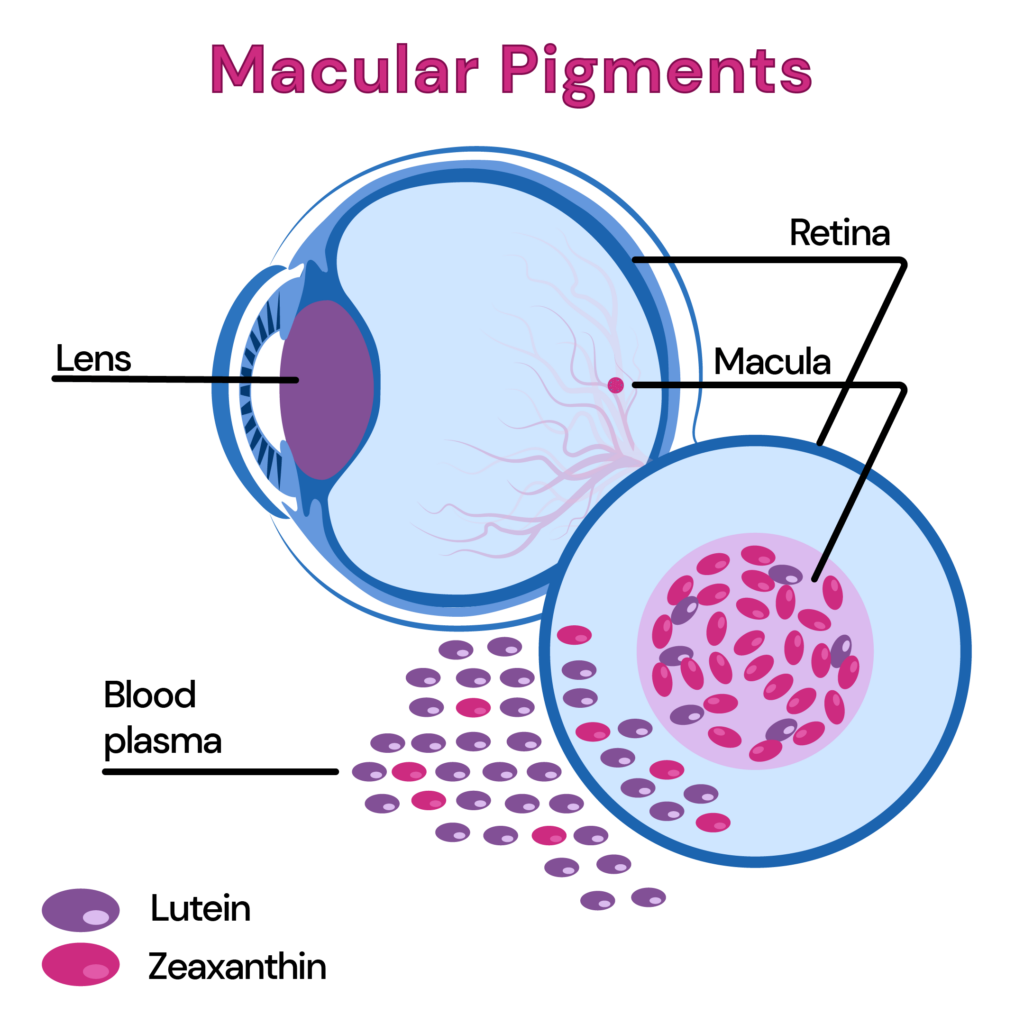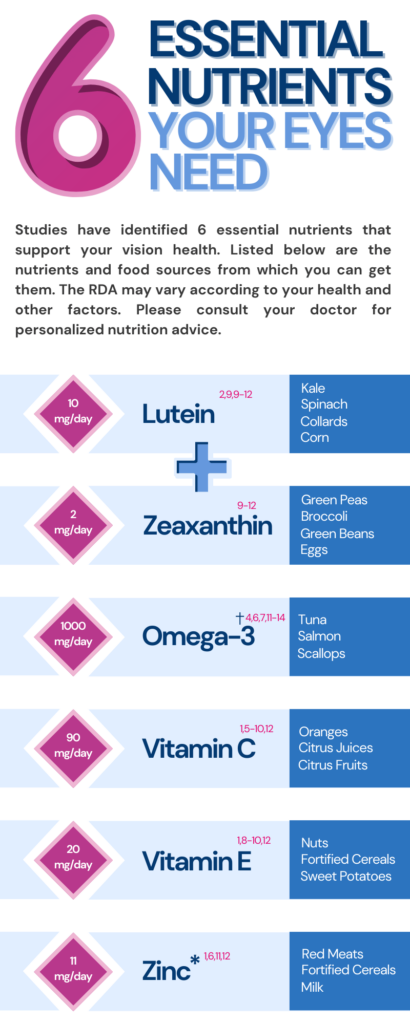Athletes must optimize every part of their bodies to achieve peak performance. When it comes to vision, even the slightest improvement in an athlete’s visual range, processing speed, and clarity can help get them a competitive advantage in their sport. A recent study reports that including dietary carotenoids like lutein and zeaxanthin supplements can help enhance the macular pigments in the eyes, protect against atmospheric haze, and improve visual range. In this article, we discuss the published study in detail and also delve into the best food sources of lutein and zeaxanthin.
Before we dive deep into the study, here is our top vision health article
Is Glaucoma Hereditary? Identifying Your Risk
How Does Nutrition Play A Role In Vision?
Ocular health is important to maintaining one’s quality of life and staying healthy and independent.
Across the world, about 250 million people have different degrees of vision problems.
Age, lifestyle changes, imbalanced diet, metabolic disorders, and eye trauma are all reasons that can cause vision loss.
For athletes, good vision is extremely vital.
Athletes need perfect vision beyond the recommended 20/20 eyesight.
Factors like depth perception, focal flexibility, visual reaction time, and dynamic visual acuity (the ability to distinguish shapes and features from a distance) are essential for athletes to excel at their sport.
Sports optometrists are specialized experts who design strategies to help athletes care for their ocular health and improve vision.
One of the main areas of focus for sports optometrists is the right nutrition.
Various macro and micronutrients play a role in protecting the eyes and preventing the signs of age-related and environmental damage to the eyes.
Plant-based carotenoids, especially, play a vital role in protecting eye health.
Carotenoids are pigments that give plant and animal food sources their color.
Lutein and Zeaxanthin Supplements: Key Plant Compounds Food Good Vision
Two main carotenoids of interest in vision health in athletes are lutein and zeaxanthin.
Lutein
Lutein is a type of carotenoid found in plant and animal food sources.
Lutein may help prevent oxidative damage, reduce glare impairment, and enhance vision sharpness.
Lutein is majorly found in green leafy vegetables like kale, collards, and spinach and yellow-colored flowers and vegetables.
Zeaxanthin
Zeaxanthin is also a type of carotenoid that supports eye health.
This carotenoid acts as a filter, blocking harmful UV rays from damaging the eyes.
Oranges, grapes, mangoes, orange peppers, goji berries, and corn are some zeaxanthin sources.
Study Overview
A 2023 study published in the Exercise and Sport Sciences Reviews journal analyzed the importance of nutrition in improving the vision of athletes.
This study focused on lutein and zeaxanthin components and their help in building up the macular pigments in the eye.
Macular pigments are like internal sunglasses for the eyes.
These are located in the central retina and comprise three dietary carotenoids - lutein, zeaxanthin, and meso-zeaxanthin.
These pigments filter out blue light and decrease the effects of light scatter, both of which can lead to vision damage and Age-related Macular Degeneration (AMD).
Macular Pigment Optical Density (MPOD) is a measure of the density of the macular pigment.
Higher levels of MPOD would help protect and improve vision.

Study Details
This study focused on two significant ocular challenges that athletes face - low visual range and atmospheric haze.
Visual range is the maximum distance the viewer can see unobstructed and clear images with unaided eyes.
Atmospheric haze is environmental obstructions like dust, haze, smoke, or dirt that can disrupt vision and create a bluish or brownish tint to the view.
Study Observations
This study reports that improving dietary carotenoid intake can help increase MPOD.
High MPOD can enhance the visual range and protect against atmospheric haze.
Multiple older studies support this observation.
A 2012 study analyzed the effects of lutein and zeaxanthin on the visual performance of athletes.
The study reports that these carotenoids may help athletes in the following ways.
- Reduce glare discomfort
- Shorten photo stress recovery time
- Increase visual range
- Improve chromatin contrast
- Increase temporal processing speed
Another study conducted in 2013 reported that lutein and zeaxanthin affected the visual and motor regions in the Central Nervous System and improved visual motor responses.
In 2014, a double-blind, placebo-controlled study analyzed the effects of lutein and zeaxanthin on neural processing speed. The study reported that these carotenoids helped increase visual processing speed in individuals across different age groups.
Study Conclusion, Limitations, and Future Directions
According to this study, even the slightest improvement in visual ability can be advantageous to athletic performance.
Athletes often focus on protein-rich foods to match their activity levels.
Along with that, a diet plan rich in carotenoids will help improve brain and retinal levels of lutein and zeaxanthin.
Lutein and zeaxanthin can help improve cognitive and visual performance in athletes.
These carotenoids can also protect athletes from eye problems like actinic eye and AMD.
Best Food Sources Of Lutein and Zeaxanthin
Lutein can be converted into meso-zeaxanthin in the body.
That’s why scientific sources mention foods containing lutein and zeaxanthin as a single category.
The following are some of the best food sources of lutein and zeaxanthin.
| Food sources | µg/g fresh weight |
| Basil | 70.5 |
| Parsley | 64.0–106.5 |
| Spinach | 59.3–79.0 |
| Leek | 36.8 |
| Peas | 19.1 |
| Broccoli | 7.1–33.0 |
| Carrot | 2.5-5.1 |
Table source: https://www.ncbi.nlm.nih.gov/pmc/articles/PMC3705341/table/nutrients-05-01169-t001/?report=objectonly
While most grains have negligible sources of lutein and zeaxanthin, durum wheat and einkorn are two sources of grain rich in carotenoids.
Summary: Lutein and Zeaxanthin Supplements
- Ocular health is essential for athletes to achieve peak performance.
- Factors like visual range, temporal processing range, depth perception, and visual reaction time are all strategies that can help athletes excel at their sport.
- Lutein and zeaxanthin are carotenoids in certain foods that may support eye health.
- These carotenoids are pigments found in green leafy vegetables and yellow and orange-colored fruits, vegetables, and flowers.
- A 2023 study discussed the role of nutrition in improving the vision of athletes and reported that lutein and zeaxanthin are essential in building the macular segments of the eye.
- Lutein, zeaxanthin, and meso-zeaxanthin form the macular segments in the eye. Consuming more of these carotenoids helps increase the Macular Pigment Optical Density (MPOD).
- Higher MPOD levels protect against vision loss and UV damage and increase visual range, helping athletes perform better.
References
https://www.ncbi.nlm.nih.gov/pmc/articles/PMC10259207/
https://pubmed.ncbi.nlm.nih.gov/24148268/
https://pubmed.ncbi.nlm.nih.gov/23053558/
https://www.ncbi.nlm.nih.gov/pmc/articles/PMC4176961/
https://www.aoa.org/healthy-eyes/caring-for-your-eyes/diet-and-nutrition?sso=y
https://www.ncbi.nlm.nih.gov/pmc/articles/PMC6771137/
https://www.aao.org/eye-health/tips-prevention/diet-nutrition
https://www.ncbi.nlm.nih.gov/pmc/articles/PMC3725486/
https://www.ncbi.nlm.nih.gov/pmc/articles/PMC3705341/
https://www.sciencedaily.com/releases/2023/06/230608120930.htm





